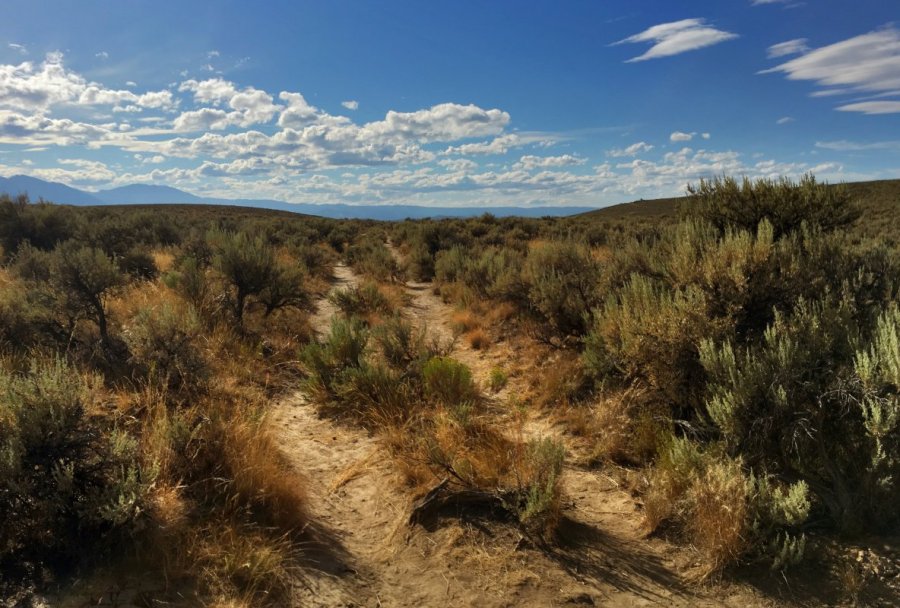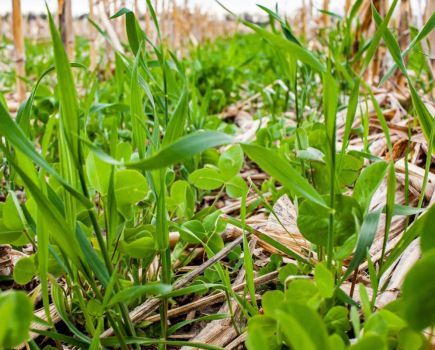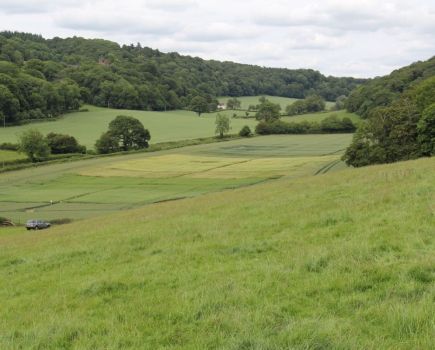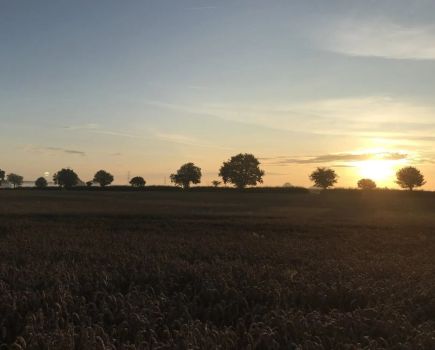Family tragedy, financial trouble and a great deal of soul searching has caused a paradigm shift from conventional agronomics to regenerative methods for 2016 Nuffield Farming Scholar Ben Taylor-Davies. CPM went with him to the No-till on the Plains Conference.
It was the fact you could still see these tracks (on the Oregon Trail) that made me realise that everything starts with soil health.
By Emily Padfield
What do behemoths of regenerative agriculture Allan Savory, John Kempf, Ray Archuleta, Gabe Brown and our very own UK-based Ben Taylor-Davies have in common? They’ve all headed up the prestigious No-till on the Plains Winter Conference, held in the US Mid-West every January.
When UK farmer and regenerative agronomist Ben Taylor-Davies was asked to give the keynote speech at the Kansas-based event, now in its 26th year, he admits to having been a bit taken aback.
“I initially thought it was strange to ask someone from the UK to come and talk to a load of farmers who knew so much about no-till and regenerative farming already, especially after those who I describe as my heroes had spoken before.
“But then organiser, Steve Swaffer said to me, ‘Here’s your curve ball; I want you to talk about you and your journey’.”
And this is the story he told the delegates. Ben was brought up on a 210ha (520-acre) Herefordshire farm on the Welsh border near Ross-on-Wye. “My father was pretty adamant about me not farming as he believed there wasn’t a future in it for me.”
Instead, Ben went to Liverpool University to study Geography and Palaeontology. “When I finally graduated, I thought my father would have softened up, but he told me to go and get a job.”
In 1997, Ben went to work as an agronomist in Oxfordshire. He married Helen in 2003, and although he wasn’t living at Townsend Farm at the time, he did manage to persuade his father to enter the farm into a number of agri-environment schemes.
Soon after, his daughters Tegan and Erin were born and the family moved home to Herefordshire in 2005. “As I moved home, my father rented the farm out,” he says candidly. “So, I continued with my job as an agronomist with Hutchinsons and to be honest I was doing rather well.”
In May 2011, Ben’s only son, Jobe, arrived and life was complete, with Ben describing his family as a loving unit with a zest for life and happiness.
Then came September 2012, when little Jobe was kicked by one of the family’s horses and Ben’s world stopped. Jobe was given less than a 10% chance of survival after being airlifted to Birmingham Children’s Hospital, where he spent the next 23 days in a coma.
“My daughters held me together in those darkest of times, and Helen was amazing, as she has been throughout our marriage.”
After 23 days, Jobe started to wake from the coma. It would be a further 18 weeks before he finally returned home, and then the family was faced with the reality that a lot of ongoing treatment and care would be required.
“The elation over Jobe’s survival was extraordinary. Helen and I threw ourselves into fundraising for Birmingham Children’s Hospital and managed to raise £290,000 and I guess the momentum of that work and his recovery kept us going.”
But the come-down was all too real, he admits. “I had a disabled child. I had a real problem saying that for those years. I wouldn’t accept any help, and I wouldn’t have a wheelchair in the house.”
He admits he wasn’t in a good place, both at work and at home. “I struggled with leaving home and my family to go to work. What I also realised was that I killed things for a living and a hobby.
“At work I was a chemical and fertiliser salesman and as a hobby I would shoot, hunt and fish. I had spent all that time in that hospital praying my son would survive. Why was it down to me to spend my life killing things? I was in a real dilemma.”
The pivotal moment was when Helen persuaded him to apply for a Nuffield Farming Scholarship in 2016, adds Ben.
“My subject was on the control of blackgrass. The industry had run out of chemicals, we’d tried pretty much everything, and the issue was just getting worse. But the problem was, I was awarded a Nuffield and I didn’t really want it. I knew I was going to have to travel the world, largely alone and leaving my family at home on their own.”
This was further compounded when, during Ben’s first Nuffield conference, his father passed away. Although he admits he wasn’t close to his father, it did change a lot for the family farm. His father hadn’t done any successional planning and the farm was subsequently exposed to a lot of financial pressure.
But Helen was adamant that he went away to complete his Nuffield studies, says Ben. “So, I bought a six-week ticket to the USA, landing on the Canadian border and flying back out of Texas.”
He couldn’t speak to his wife or family for a week before he left, he remembers. “I felt so awful for leaving them. When I arrived in the US, I was at a crossroads. I thought you can either use these six weeks to change your life around or spend it moping around wishing you were at home.”
He opted for the former, conceding that it turned out to be one of the most amazing journeys he’s ever been on and largely because he’d done it on his own.
“I was meeting farmers, specialists and experts – everyone was so welcoming. But it was the concept of opposite ag that fascinated me. Basically, whatever I was doing if I did the opposite, I’d be far better off.”
Ben visited dozens of farms and research institutions, where he learnt about the five principles of soil health, no-till, cover cropping and many other aspects of conservation ag. Yet it wasn’t until he visited the Oregon Trail, a 2200-mile wagon trail used by early settlers travelling from east to west from the 1830s, that he had his ‘ah-ha’ moment.
“It was the fact you could still see these tracks that made me realise that everything starts with soil health, and that if you damage it without remedying this, it simply can’t recover. Thanks to this road trip my life began to change.”
As well as North America, Ben travelled to South Africa, South America, across Russia into China and then onto Indonesia, finally ending up in Australia where his family joined him. “I travelled for 22 weeks. I got addicted to travelling and learning everything I could about different ways of doing things.”
Ironically, the two conclusions Ben made as a result of his Nuffield Scholarship, he didn’t need to leave the UK for. “One was what my old rugby coach used to tell us at half time when we were losing: ‘If it’s not working, go back to basics. Do the simple things well and everything else will come’.”
And the other he stumbled across in Manchester. “I came across some graffiti saying, ‘Question everything’ with a retort being scribbled: Why?”
Returning from his travels, Ben was ready to take control of the farm. “Desperation leads to innovation. I knew I needed to do something different.”
But there were still some problems to overcome. “The farm was still rented out, as I had my Nuffield to finish and a full-time job, however fortunately the family contracting it were more than willing to try an alternative approach.”
The harshest reality on the home farm was the amount of soil loss there had been due to ‘conventional’ farming techniques used over the decades, describes Ben. This could be measured thanks to a hedge having been planted in 1974 when the field had been level. In addition, a 3.7m (12ft) grass margin had been established in 2007 which was another useful measuring point.
“We were still losing soil up until 2016 and we reckon that over the past 45 years, we’ve lost close to 400,000t of soil into the River Wye, which borders our land.”
Ben started looking at what he describes as the incredible business model that is farming. “You take three free things; rain, sunlight and CO2; put them through the catalyst, the soil, and convert them into money.
“Unfortunately, we were rather hopeless at farming that free energy, largely due to not having a growing crop in the ground during the months we get most sunlight, July and August.”
Although things were starting to change on the farm, Ben was still working full-time as an agronomist, but he was feeling uneasy about his role. It was when he went to visit one of his long-term clients that another turning point was reached, when the owner explained he was just not happy with the way they were farming.
“I started to prepare a defence for ag chem, fertiliser and other inputs, but I got halfway up the drive and deleted the presentation.
“Instead, I sat there and explained to him and his family what I’d seen and learnt from around the world. Amazingly, he backed me to implement a regenerative approach on the farm and told me that I should really be talking to other clients about this.
“Then, of course, my job role as a chemical and fertiliser advisor sort of became untenable,” he quips.
And so the regeneration of an agronomist occurred, and he became known as ‘RegenBen’. But that metamorphosis brought with it a host of other questions, says Ben. “Could I cut loose from the shackles of employment. Would my knowledge be valuable? How much would I charge them?”
When he finally went solo, the release of pressure was incredible, he describes. “And I started practicing what I preached on our farm, which made it even more fun.
“You’re making a difference. Most of the time when a farmer sees an agronomist coming up the farm drive, he’s thinking how much they’re going to spend. Now when I go to see clients, they want to go and look at things, like flower meadows and cover crops, and what’s happening to their soils. It’s good for your mental health to be doing good things,” he says.
“When I take on a client to advise them, I don’t want them to be trapped into always having to rely on me. I want to help them on their journey so that they don’t need me, which I guess isn’t a very good business model,” he smiles.
“One important thing I have learnt along the way, is that it’s more than our soils that needs armouring. I realised that I have to protect what is the most important thing, my family.”
Jobe’s recovery has been miraculous. He’s able to walk short distances and has a good command of language and interaction, however he has no danger awareness and so requires 24-hour care and will do for the rest of his life, he says.
This is what drives Ben to think about the future. “We’ve put a 30-year plan together, have regular succession meetings, and we talk openly about things. It’s never too early to start talking about succession.”
Biodiversity is key to everything at Townsend. Arable crops now grown on the farm include multi-variety wheat with 243 varieties all mixed together. “I get low disease pressure in my wheat now and because of the different crop heights, each can intercept optimum levels of light for photosynthesis, as well as correct nutrition.”
Sheep, cattle, goats, alpacas, pigs, chickens and ducks all play their part in the system, with cover crops providing not only an extra source of income from the livestock, but boosting the farm’s biodiversity offering still further.
“Regenerative agriculture has led to a 63% environmental net gain on our farm. On some fields in the past seven years, our water retention score has improved from four to nine with nitrogen use down by 70%.
“Our long-term goal is to have 20 different, diverse enterprises each contributing to farm income. These currently include the farm shop, brewery, farm shoot, glamping, an upcoming drinks business as well as the livestock and arable.
“Essentially, everything still comes down to soil. The majority of yield is determined by a healthy soil, and healthy soil means healthy animals and less inputs. And when you’re happy that what you’re doing is the right thing, not only the environment, but for your business and family, then you’re in a good place.”
Look out for more from Emily Padfield on her trip to the No Till on the Plains conference in the pages of CPM over the next few issues.




